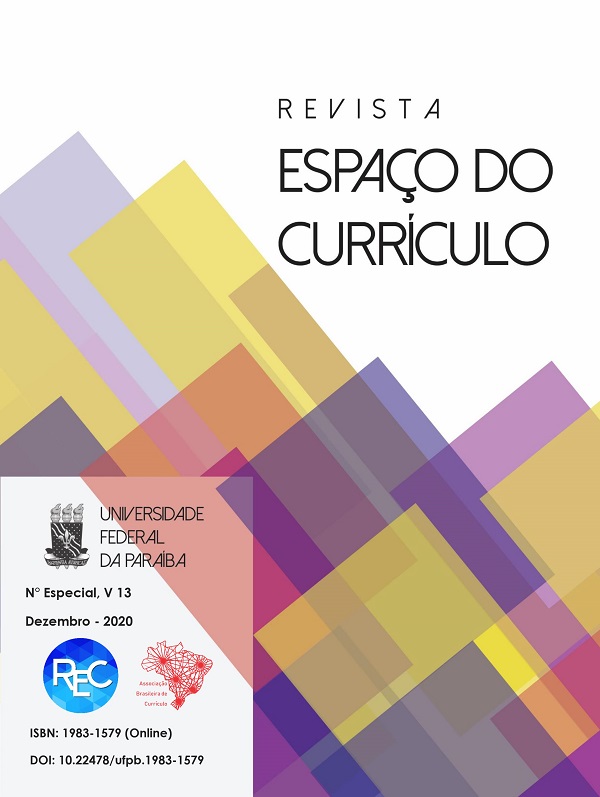DIFFERENCES, INTERCULTURAL EDUCATION AND DECOLONIALITY
insurgent topics
DOI:
https://doi.org/10.22478/ufpb.1983-1579.2020v13nEspecial.54949Keywords:
Critical intercultural education, Decolonial perspective, Insurgent educational knowledge-practicesAbstract
We are living in a crisis, which affects different dimensions of social and political life. In the education field, conservative positions are confronted with an intense movement, both of social mobilization and academic production, of recognition of different socio-cultural groups, inferior and submitted in our society. This work is situated in this perspective and is guided from decolonial perspective and its inter-relation with critical intercultural education. Besides
approaching this issue, it presents other ones that have acquired special relevance nowadays. That means, equality-difference, intersectionality, empowerment, whiteness, and knowledge ecology. It reflects about each one of these issues and indicates their implications for the educational process development. In the final considerations – insurging… - it points out some challenges to move in this direction in theoretical and practical ways. It defends that this perspective requires deconstructing a standard conception of the school format and curricula, questioning the coloniality present in school cultures, recognizing countless knowledges and insurgent practices carried out by teachers in daily school life, and placing in the middle of our searches to construct a critical intercultural and decolonial education, the submitted and inferior social groups in our society.
Downloads
Metrics
References
ALMEIDA, Silvio Luiz de. Racismo Estrutural. São Paulo: Sueli Carneiro; Pólen, 2019, p. 162.
AKOTIRENE, Carla. O que é Interseccionalidade? São Paulo: Sueli Carneiro; Pólen, 2019, p. 113.
BALLESTRIN, Luciana. América Latina e o Giro Decolonial. Revista Brasileira de Ciência Política, n. 11, p. 89-117, Brasília/DF, maio-agosto de 2013.
BILGE, Sirma. Théorisations Féministes de “Intersectionnalité". Diogène, n. 225, p. 70-88, Paris, janeiro-março de 2009.
BATLIWALA, Sirilatha. The meaning of women’s empowerment: new concepts from action. In: G. Sen, A. Germain & L. C. Chen (eds.), Population Policies Reconsidered: health, empowerment and rights, Boston: Harvard University Press, 1994.
BRASIL. Lei n. 10.639 de 9 de janeiro de 2003. Altera a Lei n. 9.394 de 20 de dezembro de 1996, que estabelece as diretrizes e bases da educação nacional, para incluir no currículo oficial da rede de ensino a obrigatoriedade da temática "História e Cultura Afro-Brasileira", e dá outras providências. Brasília: Casa Civil, 2003.
BRASIL. Lei 11.645 de 10 de março de 2008. Altera a Lei 9.394 de 20 de dezembro de 1996, modificada pela Lei 10.639/2003, que estabelece as diretrizes e bases da educação nacional, para incluir no currículo oficial da rede de ensino a obrigatoriedade da temática “História e Cultura Afro-Brasileira e Indígena”. Brasília: Casa Civil, 2008.
CANDAU, Vera Maria. Diferenças Culturais, Interculturalidade e Educação em Direitos Humanos. Educação & Sociedade, v. 33, p. 235-250, Campinas/SP, 2012.
CANDAU, Vera Maria Ferrão e RUSSO, Kelly. Interculturalidade e Educação: na América Latina: uma construção plural, original e complexa. Diálogo Educacional, v.10, (PUCPR), Paraná, 2010.
FLEURY, Reinaldo. Educação Intercultural e Movimentos Sociais. João Pessoa/PB: Editora do CCTA, 2017, p. 319.
FRASER, Nancy. Da Redistribuição ao Reconhecimento? Dilemas da Justiça numa era ‘Pós-Socialista’ Cadernos de Campo, v. 15, p. 151-169, São Paulo, 2006.
CRENSHAW, Kimberlé Williams. Demarginalizing the intersection of race and sex; a black feminist critique of discrimination doctrine, feminist theory and antiracist politics. University of Chicago Legal Forum, 1989.
MALDONADO TORRES, Nélson. Sobre la Colonialidad del Ser: contribuciones al desarrollo de un concepto. In: CASTRO-GÓMEZ, Santiago y GROSFOGUEL, Ramón. (Orgs.) El Giro Decolonial. Reflexiones para una diversidad epistémica más allá del capitalismo global. Bogotá: Universidad Javeriana-Instituto Pensar, Universidad Central-IESCO, Siglo del Hombre Editores, p. 127-167, 2007, p. 307.
SANTOS, Boaventura de Souza. Uma Concepção Multicultural de Direitos Humanos. Lua Nova [online]. n. 39, p. 105-124, 1997.
SANTOS, Boaventura de Souza. Para além do Pensamento Abissal: das linhas globais a uma ecologia de saberes. In: SANTOS, Boaventura de Souza e MENESES, Maria Paula. (Orgs). Epistemologias do Sul. São Paulo: Cortez, p. 31-83, 2010, p. 637.
SANTOS, Boaventura de Souza. A Cruel Pedagogia do Vírus. Coimbra: Almedina, 2020, p. 32.
SCHUCMAN, Lia Vainer. Entre o Encardido, o Branco e o Branquíssimo: branquitude, hierarquia e poder na cidade de São Paulo. São Paulo: Annablume, 2014, p. 192.
WALSH, Catherine. Memorias del Seminario Internacional “Diversidad, interculturalidad y construcción de ciudad”. (Bogotá, 17-19 de abril de 2007). Bogotá: Universidad Pedagógica Nacional, 2007.
Downloads
Published
How to Cite
Issue
Section
License
Copyright (c) 2020 Curriculum Space Journal

This work is licensed under a Creative Commons Attribution 4.0 International License.
By submitting an article to Curriculum Space Journal (CSJ) and having it approved, the authors agree to assign, without remuneration, the following rights to Curriculum Space Journal: first publication rights and permission for CSJ to redistribute this article. article and its metadata to the indexing and reference services that its editors deem appropriate.
















